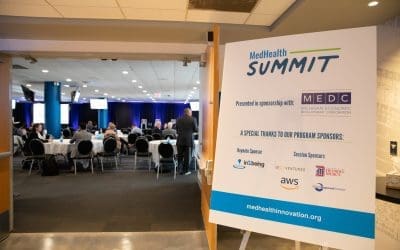Stacey Frankovich and Dr. Phillip Olla, chief executive officer at Audacia Biosciene and a member of MedHealth’s executive board attended the AIMed Global Summit in San Diego, CA in June. The event brought together industry leaders, experts, and visionaries to discuss how the healthcare sector can ensure it remains at the forefront of the ever-accelerating AI revolution while navigating the complexities of an evolving landscape.
Dr. Olla recaps his experience below.
Questions and Answers
Why did you attend the AIMed Global Summit?
I attended the AIMed Global Summit to explore the various innovations being developed for healthcare and to benchmark our level of AI preparedness with what was actually happening in practice across the globe. The AIMed summit aimed to ensure the healthcare sector does not lag behind the AI revolution. I was hoping to discover compelling AI-enabled solutions and find guidelines and solutions to the multitude of challenges we face incorporating advanced technology effectively.
What were some of your biggest takeaways from the event that our cross-border community should consider?
The biggest takeaways for me can be summarized in three points:
- AI is advancing at such a rapid pace it’s difficult to keep up with the daily advances, but everything we need to truly transform healthcare has already been developed. Our focus should not be more advanced AI widgets but on exploring how we deploy AI technology in an ethical, unbiased, safe, and productive way.
- Implementing AI projects in the corporate setting is such a daunting task, and we need to find ways to collaborate to reduce the challenges. It was great to see the various initiatives that convened diverse healthcare stakeholders such as governments, AI platform developers, innovators, providers, payers, and educators to define standards, draft regulations, and promote best practices and recommendations.
- AI has been successfully deployed in many healthcare settings for a variety of use cases playing a crucial role in healthcare. Traditional AI deployments excel in structured data analysis and rule-based decision-making. Examples on display included medical imaging in radiology and dermatology. Emerging solutions deployed a Language Model (LLM) approach, using natural language processing capabilities to support transcription, clinical decision support, and patient engagement. LLM models analyze unstructured data, provide evidence-based recommendations, and offer personalized interactions. By combining the strengths of both approaches, healthcare can benefit from improved diagnostics, streamlined processes, enhanced decision-making, and increased patient satisfaction. AI’s impact on healthcare is going to be far-reaching and transformative.

Dr. Olla, Franz Salas, and Stacey Frankovich at AIMed Global Summit 2023
We know you’re currently teaching in the health services administration program at the University of Detroit Mercy. Did you get anything out of this conference that will support your work?
At the University of Detroit Mercy, we are convening healthcare providers and community partners to develop a new initiative to accelerate the deployment of AI technology into society in an ethical, secure, and sustainable way. I learned that by leveraging AI technology in a systematic way, we have the potential to revolutionize healthcare for low-income communities, fostering health equity and diminishing disparities. The integration of AI can not only address existing inefficiencies but also bridge the technological gap prevalent in the healthcare sector. It is crucial to expedite the adoption of AI to drive positive transformations.



